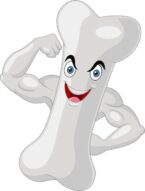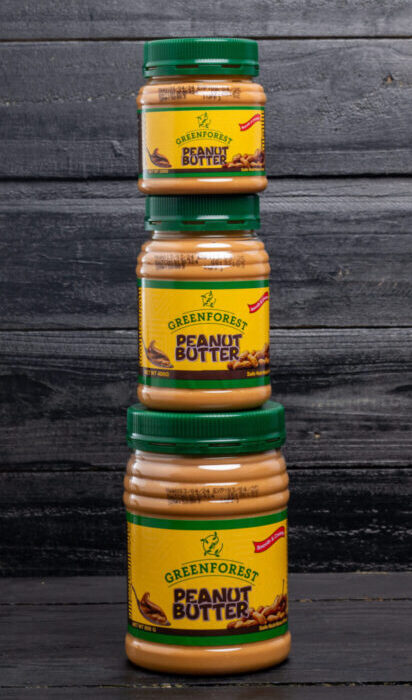Category: Uncategorized
From Liquid Gold to Solid Splendor: Understanding Honey Crystallization
Its early in the morning , you rise with anticipation, eager to share a comforting breakfast with your loved ones. But as you reach for the familiar jar of honey to sweeten your day, your hand hesitates. Something is amiss. Instead of the smooth, golden liquid you expected, you find the once-fluid honey has transformed into a mass of tiny crystals, glistening in the morning sun. You may be tempted to discard the jar of honey because it looks crusty and flaky, it surely must have gone bad, right? Actually, it has not! Crystallization is a natural process that pure honey goes through. It occurs when the glucose in the honey separates from the water and stabilizes, turning into crystals.
A very interesting fact by the way, is that properly stored honey can remain good to eat for decades, even centuries if possible. Honey’s low pH and high sugar content makes it nearly impossible for organisms that make food go stale to survive. The magic from bees keeps your honey safe to enjoy for a very long time- even when it is crystallized.
Lets talk science and break it down, shall we?
Honey is a highly concentrated sugar solution. It contains more than 70% sugars and less than 20% water. That unstable solution is the one we all recognize, the gummy viscous texture from that unstable situation.
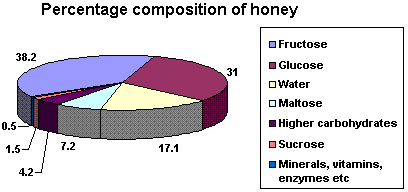
Honey contains sugars, the two principal sugars being fructose(fruit sugar) and glucose(grape sugar). Generally the fructose in honey ranges from 30%- 44% and glucose from 25%- 40%. This sugar will want to stabilize and it will gradually granulate to create that stability and crystalline texture. These recently created crystals tend to gather at the bottom of the bottle because they are denser than the honey that hasn’t solidified yet. Honey transforms from an unsaturated solution to a more stable saturated state as more and more glucose crystallizes; this is that thick, gritty honey you found.
Certain types of honey exhibit uniform crystallization, whereas others only partially crystallize, resulting in two layers: a liquid on top and a crystallized layer at the bottom of the jar. The size of the crystals that form in honey varies as well. While some produce huge, rough crystals, others generate delicate ones. The honey will crystallize more quickly and have a finer texture. Compared to liquid honey, crystallized honey typically sets a paler tint. This is because glucose crystals are naturally pure white and glucose sugar has a tendency to split apart when it dehydrates. Deeper honey on the other hand will have a hint of dark brown
Why don’t consumers like Crystallization?
The simple answer is that most consumers are unfamiliar with it because they are used to the highly processed honey that has all of its nutrients destroyed and its pollen removed.
How fast will honey crystallize? And what factors contribute to this process?
The rate at which different varieties of honey crystallizes varies. After being removed from the combs, some honey crystallizes in a matter of weeks, while other honey stays liquid for months or even years. The pace at which crystallization occurs is determined by the following factors:
- The source of nectar that bees gather (sugar content of honey)
- The handling and processing techniques used for honey
- The moisture content
The storage temperature has a very big effect. The fastest honey crystallization occurs is between 10 and15ºC. The rate of crystallization slows down below 10ºC. Low temperatures cause honey to become more viscous which inhibits crystal formation and diffusion. The highest temperatures at which honey resists crystallization is above 25ºC. Crystals disintegrate at 40ºC and any temperature beyond that will cause harm to honeys qualities.
How does one Liquify the crystallized honey and reverse the process?
Honey that has crystallized can be re-liquefied by slowly gently heating it in a hot water bath. A container should not be directly heated; rather heat should be given indirectly. The temperature in the beehives is about 35 ºC and can even rise to 40ºC. In order to liquify the honey, it is best to heat it at 35ºC-40ºC. Heating must be done with care if the nutritional value of the honey is to preserved and not to be spoiled, heating can be done through the following methods;
- Warm water bath
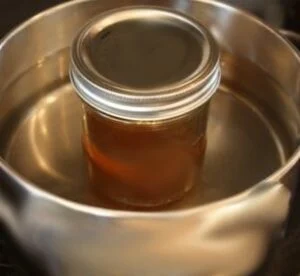
- Honey warming cabinet
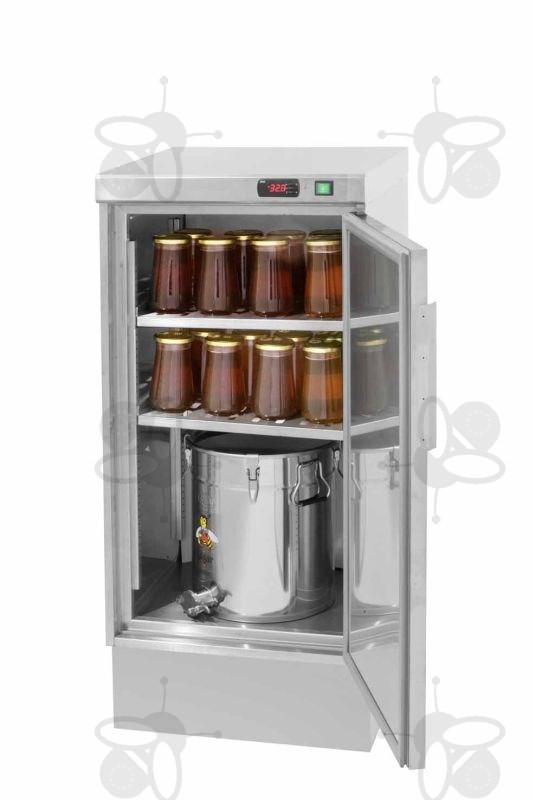
How can crystallized honey be utilized?
There are many uses for your crystallized honey if you’re ready to take a chance with it. It’s a delectable spread over toast or biscuits, or a wonderful complement to baked products. It will melt in a matter of seconds and taste delicious when added to tea or coffee. Thus, use your crystallized honey without fear and, by all means, do not discard it! The natural process of crystallization indicates that your honey is the real deal.
In conclusion..
As you savor the last remnants of your breakfast, perhaps with a dollop of crystallized honey atop your toast or stirred into your tea, take a moment to appreciate the journey this humble jar has taken you on. From initial surprise to newfound understanding, the crystallization of honey has revealed itself not as a flaw, but as a testament to its purity and natural essence. So, the next time you encounter these delicate crystals forming in your honey jar, embrace them as a sign of authenticity and a reminder of the intricate wonders that nature bestows upon us.
Phosphorus: Your bones’ best friend found in your nuts
This is why you need phosphorus in your body:
- To help your muscles to contract
- To keep your bones and teeth strong
- To aid muscle recovery after strenous activities and exercises
- To filter and remove waste from the kidneys
- To promote healthy nerve conduction throughout the body
- making DNA and RNA
- To manage the body’s energy usage and storage
So where does one get this magical mineral?
Most protein-rich foods are excellent sources of phosphorus. Nuts in particular are hea.Just 100grams
Most people get enough phosphorus in their diet, but some groups of people may need more phosphorus than others.
People who require more phosphorus include those with diabetes who take insulin to regulate their blood sugar. People with alcohol use disorder may also need to increase their phosphorus intake.
People who are low on phosphorus are likely to experience these symptoms
- loss of appetite
- fatigue
- joint pain
- bone pain
- breathing problems
- electrolyte imbalances
- confusion
- irritability
What You Need To Know About Peanut Butter
Does Peanut Butter Help With Weight Loss?
Peanut butter is believed to aid in weight loss by promoting satiation (the sensation of feeling full soon after eating) because of its protein and fat content. By curbing your appetite, peanut butter may help maintain a healthy weight and reduce the risk of obesity. While peanut butter may help curb your appetite, it’s important to watch your portions. In the end, no food can be considered “diet” if two servings account for 50% of your daily fat and 20% of a 2,000-calorie diet.
Does Peanut Butter Reduce Risk of Heart Disease?
Evidence that peanuts or peanut butter can reduce the risk of heart disease is largely mixed. Research acceded that eating 1.5 ounces of nuts per day may be beneficial to the heart but wouldn’t go so far as to say that it could prevent heart disease. Some scientists disagree. A 2016 review of studies from France suggested that an antioxidant in peanuts, known as resveratrol, can reduce cardiovascular inflammation and relax blood vessels, increasing circulation and lowering blood pressure. It is also known to decrease in LDL oxidation, which contributes to the development of atherosclerosis (hardening of the arteries) and coronary artery disease.
Do You Have to Refrigerate Natural Peanut Butter?
Natural peanut butter is made from peanuts and peanuts alone. Because it doesn’t contain any stabilizers, the natural oils can separate from the solids and need to be stirred back in before eating. It also means that natural peanut butter should be kept in the refrigerator since the oils can spoil and turn rancid in left at room temperature for too long.
The average shelf life of natural peanut butter is two to four months if left in the pantry and three to six months if refrigerated. By contrast, regular store-bought peanut butter can be stored in the pantry or refrigerator for up to one year. To soften natural peanut butter, remove from the refrigerator 30 to 60 minutes before use.
Are Natural and Organic Peanut Butter the Same?
Both natural peanut butter and organic peanut butter contain peanuts and nothing else. Organic peanut butter has to be certified, meaning that the peanuts have to be produced without the use of chemical fertilizers, pesticides, or other artificial agents.
How Can You Tell If Peanut Butter Has Gone Bad?
Sight is usually the best way to tell if peanut butter has gone bad. If it has become darker, harder, or drier, it is best to toss it. You should also smell the peanut butter. If it has lost its buttery aroma or smells off, it is better to throw it out regardless of its use-by date.
Never eat peanut butter with any signs of discoloration or mold. One type of mold common to peanut butter, called aflatoxin, is classified as a carcinogen. Animal studies have shown that long-term exposure to aflatoxin can increase the risk of liver cancer and other types of cancer.





